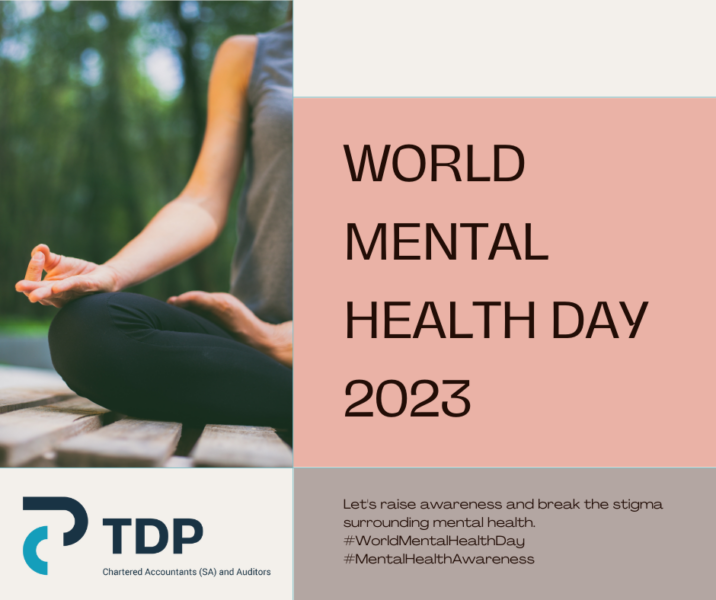


THE ECONOMIC IMPACT OF MENTAL HEALTH IN SOUTH AFRICA
Introduction
On this World Mental Health Day, we find ourselves compelled to delve into a matter of paramount importance that often goes unnoticed – the economic impact of mental health in South Africa. Mental health conditions, such as depression and anxiety, have far-reaching consequences that extend beyond the individual’s well-being; they have a substantial impact on the economy, costing an estimated R161 billion per year due to lost workdays, presenteeism, and even premature mortality. In this blog post, we will explore the alarming statistics, discuss the financial stress faced by many South Africans, especially women, and highlight the critical need for addressing mental health issues in the workplace.
The Mental Health State of South Africa
In the Mental State of the World report for 2022, South Africa scored the lowest average, indicating a widespread mental health crisis within the nation. This report serves as a stark reminder that mental well-being is a crucial aspect of overall health, one that is often overlooked in our fast-paced world.
The Second Annual Money Stress Tracker
To further shed light on the economic implications of mental health in South Africa, we turn our attention to the findings of the second annual Money Stress Tracker, released in July 2023. This extensive survey, conducted with over 35,000 subscribers of the debt counselling company, DebtBusters, paints a worrying picture. The survey reveals that a staggering three out of four South Africans are grappling with money-related stress, representing a disturbing 12 percent increase from the previous year.
The Gender Disparity
One of the most distressing aspects of these findings is the gender disparity. Women, in particular, are bearing the brunt of financial stress, which is not only affecting their personal and professional lives but also their overall health. This disparity underscores the need for gender-sensitive approaches to addressing mental health and financial well-being.
Financial Stress Across Income Levels
It’s crucial to note that financial stress does not discriminate based on income levels. While lower-income earners may face more acute financial challenges, higher-income individuals are not immune. Many South Africans, irrespective of their income, find themselves drowning in unsustainable debt, exacerbating their mental health concerns.
Presenteeism: A Silent Crisis in the Workplace
Perhaps the most concerning aspect of unaddressed mental health conditions is their impact on the workforce. Professor Renate Schoeman, head of healthcare leadership at the Stellenbosch Business School, rightly points out that presenteeism is a more significant problem than absenteeism in South Africa. This phenomenon is observed not only among lower-income workers who fear losing their jobs due to “no work, no pay” policies but also among executives who feel the need to always appear strong and capable.
Professor Schoeman highlights the indirect costs linked to mental health in the workplace, stressing that people often refrain from seeking necessary mental health support out of fear of job loss. This reluctance to seek help perpetuates the cycle of mental health challenges and further exacerbates the economic impact.
The Psychological Toll of Financial Woes
Diane Salters, a renowned psychotherapist and transactional analyst, emphasises the profound psychological impact of financial woes. Individuals facing severe debt threats often experience feelings of shame and fear, which impair their decision-making abilities. These emotions can trigger the fight, flight, or freeze responses, making it even more challenging for individuals to address their financial issues effectively.
The Deep Connection Between Financial Stability and Mental Health
Shafeeka Anthony, Marketing Manager of JustMoney.co.za, aptly underscores the deep connection between financial stability and mental health. Money worries can indeed lead to severe mental health issues and, in some cases, even push individuals to contemplate suicide. It is imperative to recognise and address this connection, especially in the midst of challenging economic times.
Outsourcing Financial Stress: The Role of Accountants
In light of these challenges, it becomes evident that individuals and businesses need effective strategies to manage their financial stress. Small business owners, in particular, face unique pressures. Fortunately, there are six areas where qualified accountants can make a significant difference:
1) Admin: Delegate the paperwork to a professional business accountant who can handle payroll, work comp audits, and HR issues.
2) Feeling Responsible for Company’s Success: Seek guidance from a trusted business advisor who can provide perspective and help you make informed decisions.
3) Compliance: Stay on top of dynamic compliance issues by relying on certified professionals who can deliver insights tailored to your needs.
4) Overhead & Expenses: Review monthly financial statements compiled by a professional to understand where your money is going and make informed changes.
5) Filing Taxes: Don’t stress about tax season; proactive tax planning and adjustments throughout the year can eliminate surprises.
6) Time Management: Delegate accounting, tax, and payroll tasks to local small business experts, freeing up your time for strategic business activities.
Conclusion
In conclusion, the economic impact of mental health in South Africa is significant and far-reaching. The findings from the Money Stress Tracker survey underscore the urgent need for addressing financial stress and its profound connection to mental health. It is imperative that individuals and businesses alike recognise the importance of seeking professional assistance, particularly from qualified accountants who can alleviate financial stress and contribute to better mental well-being.
At TDP PE, we are committed to working with you to navigate these challenges. Our monthly financial statement compilation, professional insights, and proactive tax planning can provide the support you need to make informed decisions and, ultimately, lead to better sleep at night. On this International Mental Health Awareness Day, let us collectively strive for a healthier South Africa, where economic well-being and mental health go hand in hand.
© 2023 Theron Du Plessis